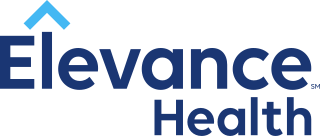In the United States, a health maintenance organization (HMO) is a medical insurance group that provides health services for a fixed annual fee. It is an organization that provides or arranges managed care for health insurance, self-funded health care benefit plans, individuals, and other entities, acting as a liaison with health care providers on a prepaid basis. The Health Maintenance Organization Act of 1973 required employers with 25 or more employees to offer federally certified HMO options if the employer offers traditional healthcare options. Unlike traditional indemnity insurance, an HMO covers care rendered by those doctors and other professionals who have agreed by contract to treat patients in accordance with the HMO's guidelines and restrictions in exchange for a steady stream of customers. HMOs cover emergency care regardless of the health care provider's contracted status.

The Medicare Prescription Drug, Improvement, and Modernization Act, also called the Medicare Modernization Act or MMA, is a federal law of the United States, enacted in 2003. It produced the largest overhaul of Medicare in the public health program's 38-year history.

Kaiser Permanente is an American integrated managed care consortium, based in Oakland, California, United States, founded in 1945 by industrialist Henry J. Kaiser and physician Sidney Garfield. Kaiser Permanente is made up of three distinct but interdependent groups of entities: the Kaiser Foundation Health Plan, Inc. (KFHP) and its regional operating subsidiaries; Kaiser Foundation Hospitals; and the regional Permanente Medical Groups. As of 2023, Kaiser Permanente operates in eight states and the District of Columbia, and is the largest managed care organization in the United States.
The Federal Employees Health Benefits (FEHB) Program is a system of "managed competition" through which employee health benefits are provided to civilian government employees and annuitants of the United States government. The government contributes 72% of the weighted average premium of all plans, not to exceed 75% of the premium for any one plan.
The term managed care or managed healthcare is used in the United States to describe a group of activities intended to reduce the cost of providing health care and providing American health insurance while improving the quality of that care. It has become the predominant system of delivering and receiving American health care since its implementation in the early 1980s, and has been largely unaffected by the Affordable Care Act of 2010.
...intended to reduce unnecessary health care costs through a variety of mechanisms, including: economic incentives for physicians and patients to select less costly forms of care; programs for reviewing the medical necessity of specific services; increased beneficiary cost sharing; controls on inpatient admissions and lengths of stay; the establishment of cost-sharing incentives for outpatient surgery; selective contracting with health care providers; and the intensive management of high-cost health care cases. The programs may be provided in a variety of settings, such as Health Maintenance Organizations and Preferred Provider Organizations.

Michael Alan Hatch is an American politician and lawyer. He was the Attorney General of Minnesota from 1999 to 2007, commissioner of the Minnesota Department of Commerce from 1983 to 1989, and chair of the Minnesota DFL Party from 1980 to 1983.
David Matthew Cutler is the Otto Eckstein Professor of Applied Economics at Harvard University. He was given a five-year term appointment of Harvard College Professor, which recognizes excellence in undergraduate teaching. He holds a joint appointment in the economics department and at Harvard Kennedy School and the Harvard School of Public Health, is a faculty member for the Harvard Center for Population and Development Studies, and serves as commissioner on the Massachusetts Health Policy Commission.

The California insurance commissioner has been an elected executive office position in California since 1991. Prior to that time, the insurance commissioner was appointed by the governor. The officeholder is in charge of the California Department of Insurance.
The California Medical Assistance Program is the California implementation of the federal Medicaid program serving low-income individuals, including families, seniors, persons with disabilities, children in foster care, pregnant women, and childless adults with incomes below 138% of federal poverty level. Benefits include ambulatory patient services, emergency services, hospitalization, maternity and newborn care, mental health and substance use disorder treatment, dental (Denti-Cal), vision, and long-term care and support. Medi-Cal was created in 1965 by the California Medical Assistance Program a few months after the national legislation was passed. Approximately 15.28 million people were enrolled in Medi-Cal as of September 2022, or about 40% of California's population; in most counties, more than half of eligible residents were enrolled as of 2020.

The Consumer Federation of California (CFC) was founded in 1960 as a nonprofit consumer advocacy organization. CFC campaigns for state and federal laws and appears at the California state legislature in support of consumer-focused regulations. The Consumer Federation of California is led by Executive Director Richard Holober and President Lucinda Sikes.
A point of service plan is a type of managed care health insurance plan in the United States. It combines characteristics of the health maintenance organization (HMO) and the preferred provider organization (PPO).
In the United States, a pharmacy benefit manager (PBM) is a third-party administrator of prescription drug programs for commercial health plans, self-insured employer plans, Medicare Part D plans, the Federal Employees Health Benefits Program, and state government employee plans. According to the American Pharmacists Association, "PBMs are primarily responsible for developing and maintaining the formulary, contracting with pharmacies, negotiating discounts and rebates with drug manufacturers, and processing and paying prescription drug claims." PBMs operate inside of integrated healthcare systems, as part of retail pharmacies, and as part of insurance companies.

The California Department of Insurance (CDI), established in 1868, is the agency charged with overseeing insurance regulations, enforcing statutes mandating consumer protections, educating consumers, and fostering the stability of insurance markets in California. The CDI has authority over how the insurance industry conducts business within California, and licenses and regulates the rates and practices of insurance companies, agents, and brokers in the state.
In the United States, health insurance helps pay for medical expenses through privately purchased insurance, social insurance, or a social welfare program funded by the government. Synonyms for this usage include "health coverage", "health care coverage", and "health benefits". In a more technical sense, the term "health insurance" is used to describe any form of insurance providing protection against the costs of medical services. This usage includes both private insurance programs and social insurance programs such as Medicare, which pools resources and spreads the financial risk associated with major medical expenses across the entire population to protect everyone, as well as social welfare programs like Medicaid and the Children's Health Insurance Program, which both provide assistance to people who cannot afford health coverage.

The California Health and Safety Code is the codification of general statutory law covering the subject areas of health and safety in the state of California. It is one of the 29 California Codes and was originally signed into law by the Governor of California on April 7, 1939.
In the United States, health insurance marketplaces, also called health exchanges, are organizations in each state through which people can purchase health insurance. People can purchase health insurance that complies with the Patient Protection and Affordable Care Act at ACA health exchanges, where they can choose from a range of government-regulated and standardized health care plans offered by the insurers participating in the exchange.

The Local Initiative Health Authority for Los Angeles County is a public agency that provides health insurance for low-income individuals in Los Angeles County through four health coverage programs including Medi-Cal.

Elevance Health, Inc. is an American health insurance provider. Prior to June 2022, Elevance Health was named Anthem, Inc. The company's services include medical, pharmaceutical, dental, behavioral health, long-term care, and disability plans through affiliated companies such as Anthem Blue Cross and Blue Shield, Anthem Blue Cross in California, Wellpoint, and Carelon. It is the largest for-profit managed health care company in the Blue Cross Blue Shield Association. As of 2022, the company had 46.8 million members within its affiliated companies' health plans.

The California Department of Financial Protection and Innovation regulates a variety of financial services, businesses, products, and professionals. The department operates under the California Business, Consumer Services and Housing Agency.
This article summarizes healthcare in California.










